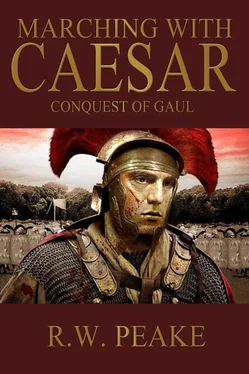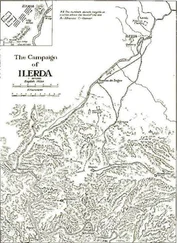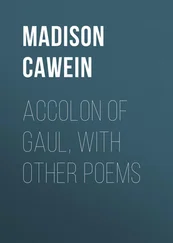R. Peake - Marching With Caesar - Conquest of Gaul
Здесь есть возможность читать онлайн «R. Peake - Marching With Caesar - Conquest of Gaul» весь текст электронной книги совершенно бесплатно (целиком полную версию без сокращений). В некоторых случаях можно слушать аудио, скачать через торрент в формате fb2 и присутствует краткое содержание. Жанр: Исторические приключения, на английском языке. Описание произведения, (предисловие) а так же отзывы посетителей доступны на портале библиотеки ЛибКат.
- Название:Marching With Caesar: Conquest of Gaul
- Автор:
- Жанр:
- Год:неизвестен
- ISBN:нет данных
- Рейтинг книги:3 / 5. Голосов: 1
-
Избранное:Добавить в избранное
- Отзывы:
-
Ваша оценка:
- 60
- 1
- 2
- 3
- 4
- 5
Marching With Caesar: Conquest of Gaul: краткое содержание, описание и аннотация
Предлагаем к чтению аннотацию, описание, краткое содержание или предисловие (зависит от того, что написал сам автор книги «Marching With Caesar: Conquest of Gaul»). Если вы не нашли необходимую информацию о книге — напишите в комментариях, мы постараемся отыскать её.
Marching With Caesar: Conquest of Gaul — читать онлайн бесплатно полную книгу (весь текст) целиком
Ниже представлен текст книги, разбитый по страницам. Система сохранения места последней прочитанной страницы, позволяет с удобством читать онлайн бесплатно книгу «Marching With Caesar: Conquest of Gaul», без необходимости каждый раз заново искать на чём Вы остановились. Поставьте закладку, и сможете в любой момент перейти на страницу, на которой закончили чтение.
Интервал:
Закладка:
“By the gods, they do stink, don’t they?”
This came from the man next to me, from the Fifth Cohort, a Signifer named Frontinus. I forced a laugh, anxious to show the Germans that I found them just as amusing as they found us. “They must be afraid of water,” I replied, still keeping my eyes on the yellow haired man, who was doing the same.
“Bathing is for women, Roman.” Despite the accent, the Latin was intelligible, and I was not altogether surprised that it was the yellow-haired man who spoke.
“Ah, you know our language,” said a Sergeant named Rufus from the First Cohort, a man who was close to my size. “Then you’ll understand this, won’t you, you cunnus ?”
The yellow-haired man hissed at this epithet, his eyes narrowed in rage, and he moved his horse a few steps towards us, hand on the hilt of his blade, before one of the other Germans gave him a sharp order. He stopped, but was clearly reluctant, spitting on the ground to show his contempt.
“You have a loose tongue, Roman. I think I am going to have to cut it out some day.”
Rufus laughed, and pointed to the long blade. “With that thing? You can try, but your guts will be on the ground before you get it out of your scabbard. How long does it take to draw that thing anyway?”
“Fast enough that your head would be at your feet before you could blink, you Roman dog.” The German’s face was flushed red, his tension clearly being communicated to his mount, which began prancing nervously, its head tossing as it waited for a command from its rider.
Rufus laughed again then looked over his shoulder at the rest of us, winking as he jerked his thumb at the Germans. “They’re full of all sorts of tough talk, aren’t they boys? Hopefully we’ll get to find out how much of it’s more than just talk.”
We laughed in agreement, more to anger the Germans than anything. With the exchange over, at least for the moment, we continued to sit on our horses as Caesar and Ariovistus talked. A third of a watch passed, then another third, and we began to get bored. None of us dismounted because we were not given leave to, so I was finding that my rear was growing increasingly sore as the time dragged on. Shifting my weight around the best that I could, I fervently wished that this meeting would end. Caesar and Ariovistus had been jawing at each other, politely at first, then growing animated, although Caesar was far more reserved than Ariovistus, who made grand gestures with his hands, even thumping his chest a time or two. We could not hear exactly what was being said, but the tone was clear enough; there did not seem to be an agreement of any sort in the offing.
I am not sure exactly how long into the talk that it happened, but I do know that I was completely caught by surprise when I heard a sharp whinny and looked over just in time to see one our men’s horses rearing in the air, almost throwing him off. As I watched the Roman struggling to control his mount, I saw the reason for it; a rock came sailing through the air to smack another horse in the rump, causing it to hop away, its rider furiously trying to control the beast. Looking over I saw the Germans, smiles on their faces, just as one of them hurled yet another rock, this time thrown hard, barely missing the head of one of our men, who jerked back in reflex. Suddenly, a scene of calm transformed as both horses and riders became agitated. By reflex, I found my hand curling around the hilt of my sword, the move not lost on the yellow-haired man who sneered at me and beckoned in a gesture of challenge.
“Hold, men!” This came from Rufus, who was in charge of our detachment, and I remembered Caesar’s words, realizing that this was exactly what he had warned about.
These Germans were trying to provoke us, and it was only our discipline that kept the situation from getting out of control. Seeing that they were not succeeding in baiting us, the Germans increased the fury of their provocation, if not the style, continuing to throw rocks at us, while we did our best to dodge them. I heard a grunt of pain as one found its mark, striking a man in the ribs and he reeled in the saddle for a moment before regaining his balance, his horse turning in aimless circles as it looked to the other mounts to see what to do. The air was full of rocks whizzing by as all ten of the Germans now joined in, forcing me to unlash my shield, bringing it up to a protective position. Caesar said not to fight back, but he had said nothing about defending ourselves, and the other men followed suit, using their shields to block most of the rocks thrown at us. A couple more struck our mounts, causing them to jerk in pain, yet even as we were absorbed with this problem, one of our men saw that a fairly large group of Germans had materialized from somewhere and seemed to be headed in our direction. Calling out in alarm, he pointed out their location to the rest of us, increasing our concern about the situation. Rufus turned his mount and trotted to Caesar to report what was happening. Caesar turned to look, saw what was taking place, then turned back to Ariovistus and said something to him in a sharp tone of voice, but he was answered only with a shrug. Clearly angry, Caesar jerked his mount around, cantered to us and called for us to withdraw from the mound, which we did, the jeers and taunts of the Germans ringing in our ears.
The ride back to camp was an angry one, a mood that Caesar shared with us. We had acted in good faith, and the arrogance of the Germans, along with their disdain for the normal protocols of events like this talk rubbed us all very raw indeed. Each of us swore that we would have vengeance, and Caesar assured us that we would have the opportunity, but only when the time was right. When we entered the camp, the men who gathered to greet us could instantly see that things had not gone well, and I had barely returned my mount to the enclosure before I was swarmed by my friends wanting to know what happened. When I relayed what transpired, their anger was soon added to the original ten men who went with Caesar. Before dawn the next day, the whole army was spoiling for a fight, and took every opportunity to let Caesar know that they were ready for battle the moment he commanded it. For two days nothing happened before Ariovistus sent another envoy requesting another talk. This time Caesar was not about to expose himself to their treachery, instead choosing two men, an interpreter named Procilus and a man named Metius who Caesar believed would be safe from harm, since Metius was not high ranking and he knew Ariovistus. I do not know if Caesar calculated that Ariovistus would do something provocative and made his choice accordingly, picking someone whose loss would not do great damage to the army or his prestige, but it still worked out that way. On arriving to speak with Ariovistus both the interpreter and Metius were accused of spying and slapped in chains. That same day, Ariovistus moved his whole army, which as was the custom of their people, included all the women and children, to a spot at the base of some mountains some six miles to our north. The threat could not have been clearer; he was challenging us to come and fight him. Nevertheless, we stayed in camp. On the next day, he moved his host right past us, in plain view of our walls, to a spot about two miles to our south, cutting off our supply route from the Aedui and Sequani, although there were still supplies coming from the west from other tribes. Regardless, it was a threat, not to mention disconcerting, to have such a large host effectively in our rear. Still, we did nothing for five days, short of sending out cavalry patrols that skirmished with the Germans every single day, always coming out the worse for it. One reason for the effectiveness of the German cavalry was that a man on foot was assigned to every rider, this man riding into battle behind the cavalryman, then dismounting and running alongside once they got close to the fighting. Whenever they needed to move rapidly once dismounted, they would grab onto the horse’s mane and lift their feet off the ground, being transported in this manner much more quickly than if they were on foot alone. It was effective, and made defeating their cavalry very difficult. Finally on the sixth day, Caesar mustered the army, arraying us outside the camp walls facing south to challenge Ariovistus. He deployed our artillery on the rampart of the camp walls to provide cover and we stood there for the better part of a day, challenging Ariovistus to come and fight, which he refused to do. This boosted our morale even more; as our Centurions pointed out to us, no doubt at Caesar’s orders, if the Germans were as invincible as we were told, would they have ignored the chance to destroy us? The logic was irrefutable, although we were also a receptive audience, and it made us all the more eager to face them. For four more days, dawn would find us arrayed for battle, the 10th always on the right, waiting for Ariovistus, yet every day he refused to face us, causing us to lose our last vestiges of fear for the Germans, beginning to think of them with contempt, with each day fueling our resolve to make them suffer not only for the insults that they had borne us, but for the bother of having to stand in formation for five days in a row. It was the sixth day that saw a change, as instead of being arrayed for battle, we were ordered to form three columns in parallel outside the gate, two Legions to a column. We were ordered to be prepared to deploy into line for battle, the idea being to pull the same trick as Ariovistus by marching right past their camp, where Caesar planned on making a new camp a short distance away from the Germans, albeit smaller than the one we currently occupied. Marching south, we passed by Ariovistus’ camp to a spot about a half-mile further south, where the exploratores had marked out the boundaries for a camp for two Legions. Our new Legions were tasked with constructing the camp, with the rest of us standing in line of battle, daring Ariovistus to try and stop us. This was a challenge that he could not ignore, so he sent a large force out to try disrupting the construction of the camp, but his men were repulsed with heavy losses, and the camp was erected despite their efforts. The 11th and 12th were left at the new camp, while the rest of the army marched back to our original camp. The threat to our supply lines was now answered, so that all that was left was to fight the Germans and send them to Hades.
Читать дальшеИнтервал:
Закладка:
Похожие книги на «Marching With Caesar: Conquest of Gaul»
Представляем Вашему вниманию похожие книги на «Marching With Caesar: Conquest of Gaul» списком для выбора. Мы отобрали схожую по названию и смыслу литературу в надежде предоставить читателям больше вариантов отыскать новые, интересные, ещё непрочитанные произведения.
Обсуждение, отзывы о книге «Marching With Caesar: Conquest of Gaul» и просто собственные мнения читателей. Оставьте ваши комментарии, напишите, что Вы думаете о произведении, его смысле или главных героях. Укажите что конкретно понравилось, а что нет, и почему Вы так считаете.












